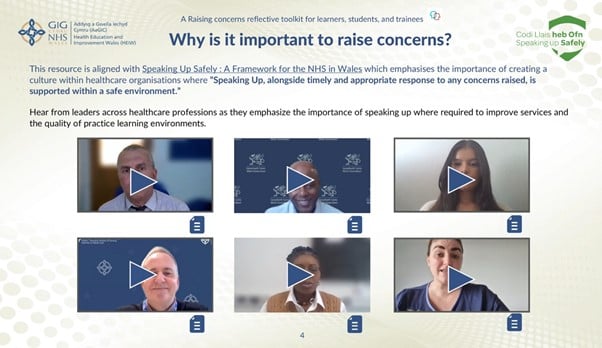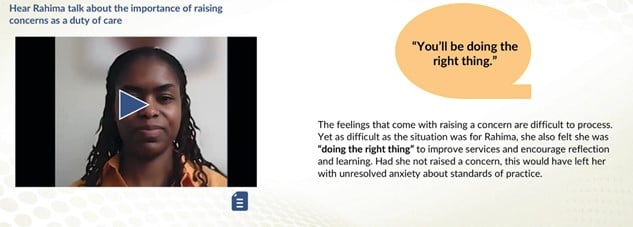Case study: Health Education and Improvement Wales (HEIW) share their work on developing a toolkit to support speaking up
Speaking up can be daunting. This case study highlights the type of practical steps an organisation can take to actively support people to raise a concern - from providing advice about what constitutes a concern, through to demystifying the process.
How did this work come about?
Everybody working in healthcare services has a right to be treated with respect and to feel safe. They also, however, have a duty to raise concerns and speak up when they see bullying, harassment, intimidation or issues of sexual safety.
This applies under the HCPC Standards of conduct, performance and ethics, as well as, for those in Wales, the Welsh Government’s Health and Care Quality Standards (2023).
The toolkit was developed with this in mind, to help learners (and those supporting them) to reflect on what they may have witnessed, make sense of thoughts and feelings, decide if a concern needs to be escalated and prepare for next steps. This could be in relation to escalating a concern to a regulator, such as the HCPC.
Toolkits like this are an incredibly useful way for organisations to demonstrate support for those thinking about raising a concern, and to encourage them to do so.
Organisations who invest in this are highlighting that raising a concern is something that they should feel empowered to do, and that they will be listened to.
Creating a culture of openness is vital in tackling behaviour issues, and ultimately makes the professions safer and more effective for both those working in them and the public/service users.

What does the toolkit include?
The toolkit includes in-depth information and guidance about:
- why it is important to raise concerns
- what constitutes a concern
- responsibilities a learner has to speak up
- the importance of feeling safe enough to speak up
The resources include sexual safety, but also discrimination, health and safety, unprofessional behaviour, and criminal activity, amongst others.
The toolkit includes a range of videos on each topic, for learners to hear directly from their counterparts about how they felt, what they did, and what they learned through their own reflections.
As well as guidance, testimonials and real-world examples, the toolkit also has templates for learners to use to help aid them in reflecting on their experiences before, during and after raising a concern.
These reflections also highlight areas of best practice and good cultures, for users to learn from and potentially incorporate into their own workplace cultures.

Supporting people every step of the way.
It’s not always easy to raise a concern.
People sometimes question whether or not what they have experienced or witnessed constitutes a concern, they can be apprehensive about speaking up due to fear of retribution, or perhaps they feel unsure of how to start what can be a difficult conversation.
The Health Education and Improvement Wales toolkit is a great example of the sort of wraparound support an organisation can put in place to help people through every step of the process.
From providing advice about what can constitute a concern, through to explaining what people can expect at each stage of the process – this type of support can help to make the difference between someone coming forward about a concern and not.
"I was invited back to get feedback on my concerns, and I could see that speaking up had led to improvements in that practice setting"
Dawn, Healthcare student
Practical steps, and what happens next
As well as guidance, testimonials and real-world examples, the toolkit also has templates for learners to use to help aid them in reflecting on their experiences before, during and after raising a concern.
The resources focus on the importance of what happens after a concern is raised just as much as what can go into making one – with the importance of ‘closing the circle’ and receiving feedback clearly stated.
It is important to remember that, with the focus of this work being on learners, the vast majority will go on to register as a healthcare professional after their studies, and that raising a concern and speaking up is part of the process of ensuring the professions they are going into remain places with a positive working culture.
The importance of raising concerns is therefore as much about looking to the future as it is about identifying individual cases, and the benefits of doing so can be felt for years to come.
Consistency and collaboration
The toolkit has been shared with all universities in Wales.
“Wales, due to its size, has the advantages of being able to collaborate closely, and coordinate effectively, across all education providers and major stakeholders. This enables us to understand and then tackle cultural issues like this at both a local and national level. That said, I feel this is work that will share strong similarities across the UK, and has the ability to be scaled up or replicated if the will is there”.
Simon Cassidy, Head of Placement Experience and Improvement Wales
The toolkit is hosted on the HEIW website
It is an incredibly valuable resource for learners in Wales, and indeed the content is applicable across the wider UK.
Health and care professionals and students have a duty to speak up and act on concerns about safety and when they witness behaviours that are wrong. It's important that organisations take steps to create environments where people feel safe to do so.
This case study from Health Education and Improvement Wales is just one example of how organisations can do that. You can take a look at our sexual safety hub, and our guidance and resources for more information and support.
- Cyhoeddwyd:
- 17/01/2025
- Resources
- Learning material
- Is-gategori:
- Case study

